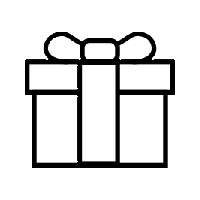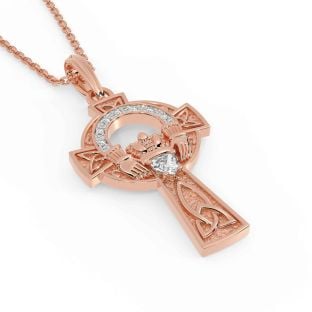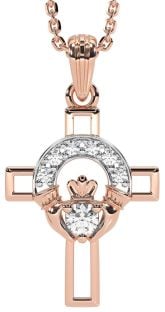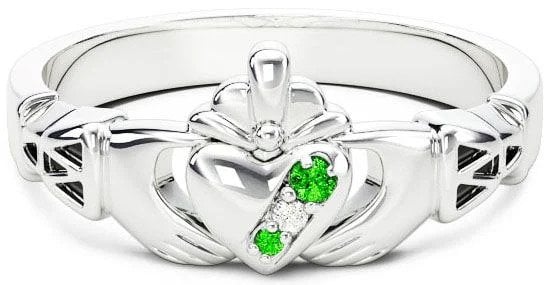Diamond Rose Gold Silver Claddagh Celtic Cross Necklace
Free Shipping
Get it in USA by Friday, Dec. 27 >
This Claddagh Celtic Cross Necklace [Selection_stone] The current selection is made from . Set with a and accent . . . . [general] [Cross_short] [Claddagh_short] [Celtic_short]
Item Details
This Claddagh Celtic Cross Necklace comes in Gold and Silver set with a choice of Diamonds and Gemstones. The current selection is made from . Set with a and accent . . . .
Individually handcrafted in Ireland. Guaranteed Quality.
Throughout Ireland & Scotland, the celts crafted these magnificent symbols in stone. Celtic Crosses pre-date Christianity and were first used by pagans to worship the sun. The Celtic Cross is now a symbol associated with Ireland and Christianity.
The Crown represents Loyalty, The Heart represents Love and the Hands represent Friendship. The Claddagh Ring originated in our home, Galway, Ireland and is now a World Famous symbol associated with Ireland.
Celtic Designs have been around since ancient times and have long been applied to create fine art. Their distinctive patterns have appeared on stone, metalwork, in jewellery and on magnificent illuminated manuscripts. This beautifully crafted piece is a fine example of the exquisite work of the celts handed down from generation to generation.
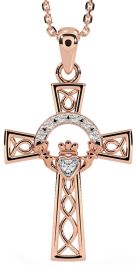
See Full Details
CENTER STONE
| Type |
N/A |
| Quality Grade |
N/A |
| Size |
1.8 mm |
| Weight |
N/A |
SIDE STONES
| Type |
N/A |
| Quality Grade |
N/A |
| Size |
1 mm |
| Weight |
N/A |
SETTING
| Height (excl bail) |
24 mm |
| Width |
17 mm |
| Metal |
|
ENGRAVING
|
Your special message... |
Chain
|
N/A |
Meaning of Design
Celtic Crosses: Throughout Ireland & Scotland, the celts crafted these magnificent symbols in stone. Celtic Crosses pre-date Christianity and were first used by pagans to worship the sun. In pagan times the circle of the Celtic cross represented the sun, being the center of their lives. It was not until the 4th century AD when it was introduced by the first Christian Roman Emperor Constantine, that the Celtic Cross was used to represent Christ's victory. During the great conversion of many pagans to Christianity, Christian Philosophers adapted the Celtic Cross and thought the meaning of the circle to represent Christ, the center of Christianity.
The Claddagh: the crown represents loyalty, the heart represents love, and the hands represent friendship. It is widely known as a symbol for great friendship. This ancient Gaelic design is also used in engagement rings and in traditional wedding rings for the Irish. If worn on the right hand with the heart facing out it means you are single, facing in means you are dating someone. If worn on the left hand with the heart facing out it means you are engaged and facing in you are married. An original symbol of the "Fisher Kings" of the Galway town of Claddagh, Ireland, (pronounced clada) the design was first fashioned into the traditional ring back in the 17th Century during the reign of Mary II. Legend has it that an Irish young man, Richard Joyce, bound for the West Indian slave plantations - no doubt the Irish Caribbean island of Montserrat - was kidnapped himself in rough seas by a band of Mediterranean pirates and sold to a Moorish goldsmith who over the many long years of his exile helped him perfect the skills of a master craftsman. When in 1689 King William III negotiated the return of the slaves, Joyce returned to Galway - despite, it said, the Moor's offer of the daughter's hand in marriage and a princely dowry of half of all his wealth. Back in Ireland a young women had never stopped faithfully waiting for her true love to return. Upon which time when he presented her with the now famous Royal Claddagh gold ring - a symbol of their enduring love. Two hands to represent their friendship, the crown to signify their loyalty and lasting fidelity, and the sign of the heart to symbolise their eternal love for each other.
Celtic Designs: have been around since ancient times, created by the highly artistic Celtic peoples, Celtic designs have long been applied to create fine art. Their distinctive patterns have appeared on stone, metalwork, in jewellery and on magnificent illuminated manuscripts. This beautifully crafted piece is a fine example of the exquisite work of the celts handed down from generation to generation.

Customer Reviews
Verified Customer Reviews
from this merchant give
them a 4 or 5-Star rating.
How to Find Your Ring Size
Sizing Tips
Finding your ring size is very simple. For the most accuracy, measure the inside diameter of an existing ring (worn on the same hand and finger), and then find that measurement on the Ring Sizing Chart. If you don’t have a ring to use, follow these easy steps:
Step 1: Cut a strip of paper long enough to fit around your finger
Step 2: Wrap the paper around your finger, just above the knuckle, and mark the point at which the two ends meet
Step 3: Measure the paper from mark to mark
Step 4: Find that measurement on the Ring Sizing Chart to locate your size
Free Resizing
If you still don't know the exact ring size to order, rest assured, we provide one (1) FREE resizing of your ring within 60 days of the original shipping date. This includes items that have been engraved.
Relationships
Grá: Means ‘love‘ (pronounced ‘graw’) copy
Cara: Means ‘friend‘ (pronounced 'Kaw-rah') copy
Croí: Means ‘heart‘ (prounounced 'cree') copy
Peata: Means ‘pet‘ (prounounced 'fat-a') copy
Stór: Means ‘Treasure‘ (pronounced ‘store’) copy
Meala: Means ‘Honey‘ (Prounounced 'M-alla') copy
Clann: Means ‘Children‘ (Prounounced 'Klan') copy
Iníon: Means ‘Daughter‘ (Prounounced 'in-yeen') copy
Mac: Means ‘Son‘ (Prounounced 'Mack') copy
Agra: Means ‘Love, Beloved or Sweetheart‘ (Prounounced 'Ag-rah') copy
Síor: Means ‘Always‘ (Prounounce 'Sheer') copy
Religious
Dia: Means ‘God‘ (Prounounced 'Dee-a) copy
Naofa: Means ‘Holy‘ copy
Anam: Means ‘Soul/Spirit‘ copy
Naomh: Means ‘Saint‘ copy
Diaga: Means ‘Divine‘ copy




